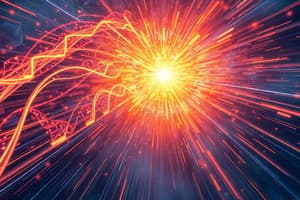Podcast
Questions and Answers
According to Newton's second law of motion, how is force related to mass and acceleration?
According to Newton's second law of motion, how is force related to mass and acceleration?
- Force is directly proportional to mass and inversely proportional to acceleration.
- Force is inversely proportional to mass and directly proportional to acceleration.
- Force is independent of mass and acceleration.
- Force is equal to the mass of an object multiplied by its acceleration. (correct)
What happens when two objects with different masses push away from each other, according to Newton's third law?
What happens when two objects with different masses push away from each other, according to Newton's third law?
- Both objects accelerate at the same rate regardless of mass.
- The forces will cancel each other out.
- The more massive object will remain stationary.
- The less massive object accelerates faster in one direction than the more massive object in the opposite direction. (correct)
In the context of action and reaction pairs, which statement is correct?
In the context of action and reaction pairs, which statement is correct?
- The forces act in the same direction.
- The forces in the pair have different magnitudes.
- For every action, there is an equal and opposite reaction. (correct)
- The reaction force is greater than the action force.
Which of the following statements correctly describes the relationship between velocity change and force required to change an object's motion?
Which of the following statements correctly describes the relationship between velocity change and force required to change an object's motion?
What are the pairs of interacting forces when a person pushes a crate on the floor?
What are the pairs of interacting forces when a person pushes a crate on the floor?
In a force diagram representing a hand petting a dog, how should the forces be indicated?
In a force diagram representing a hand petting a dog, how should the forces be indicated?
Which of the following correctly states the relationship between mass, force, and acceleration?
Which of the following correctly states the relationship between mass, force, and acceleration?
What is the meaning of the term 'momentum' in the context of physical interactions?
What is the meaning of the term 'momentum' in the context of physical interactions?
What is the term used for the product of an object's mass and velocity?
What is the term used for the product of an object's mass and velocity?
In a momentum vs. time graph, what does the slope represent?
In a momentum vs. time graph, what does the slope represent?
Which of the following forces is considered negative in the context of a free-body diagram?
Which of the following forces is considered negative in the context of a free-body diagram?
What does the equation ΣF = ma demonstrate?
What does the equation ΣF = ma demonstrate?
Which scenario correctly represents balanced forces in a static situation?
Which scenario correctly represents balanced forces in a static situation?
Which of the following is an external force affecting the net force on a system?
Which of the following is an external force affecting the net force on a system?
Which statement about momentum and acceleration is true when net force is zero?
Which statement about momentum and acceleration is true when net force is zero?
What is statics primarily concerned with?
What is statics primarily concerned with?
How does mass affect the motion of an object when equal force is applied?
How does mass affect the motion of an object when equal force is applied?
Newton's first law states that an object at rest will remain at rest unless acted upon by which of the following?
Newton's first law states that an object at rest will remain at rest unless acted upon by which of the following?
Which of the following best describes inertia?
Which of the following best describes inertia?
What effect does friction have on an object in motion?
What effect does friction have on an object in motion?
In the context of forces, what is a centripetal force responsible for?
In the context of forces, what is a centripetal force responsible for?
Which of the following accurately represents Newton's third law of motion?
Which of the following accurately represents Newton's third law of motion?
What is the primary cause of the change in motion of a soccer ball when kicked?
What is the primary cause of the change in motion of a soccer ball when kicked?
What role does tension force play in a system of connected objects?
What role does tension force play in a system of connected objects?
Flashcards
Momentum
Momentum
The product of an object's mass and velocity. It describes how much motion an object has.
Newton's Second Law and Momentum
Newton's Second Law and Momentum
Newton's second law states that the net force acting on an object is equal to the rate of change of its momentum over time.
Momentum-Time Graph Slope
Momentum-Time Graph Slope
The slope of a momentum vs. time graph represents the net force acting on an object.
System
System
Signup and view all the flashcards
Free-Body Diagram
Free-Body Diagram
Signup and view all the flashcards
Statics
Statics
Signup and view all the flashcards
Dynamics
Dynamics
Signup and view all the flashcards
Force-Acceleration Equations
Force-Acceleration Equations
Signup and view all the flashcards
Friction
Friction
Signup and view all the flashcards
Centripetal Force
Centripetal Force
Signup and view all the flashcards
Applied Force
Applied Force
Signup and view all the flashcards
Inertia
Inertia
Signup and view all the flashcards
Inertia
Inertia
Signup and view all the flashcards
Inertia
Inertia
Signup and view all the flashcards
Force
Force
Signup and view all the flashcards
Acceleration
Acceleration
Signup and view all the flashcards
Newton's Second Law of Motion
Newton's Second Law of Motion
Signup and view all the flashcards
Newton's Third Law of Motion
Newton's Third Law of Motion
Signup and view all the flashcards
Action-Reaction Pairs
Action-Reaction Pairs
Signup and view all the flashcards
Mass
Mass
Signup and view all the flashcards
Third-Law Pair Mass Difference
Third-Law Pair Mass Difference
Signup and view all the flashcards
Force Changes Motion
Force Changes Motion
Signup and view all the flashcards
Study Notes
Force, Mass, and Acceleration
- Newton's second law of motion describes the mathematical relationship between net force, mass, and acceleration of a macroscopic object
- Newton's second law can be used to predict changes in the motion of objects
- If an object on a table is pushed, it moves in the direction of the push
- A less massive object will move more when subjected to the same amount of force as a more massive object
- A force is created when one object pushes or pulls on another
- Multiple forces can act on an object simultaneously, affecting its motion
- Geologists study forces on Earth's surface, including forces causing changes like rockslides
Types of Forces
- Gravitational Force: The force of attraction between objects with mass
- Electromagnetic Force: The force acting between charged particles
- Nuclear Forces: The strongest forces in nature, holding atomic nuclei together
- Inertia: An object's resistance to a change in motion, directly related to its mass
- Newton's Third Law: For every action, there is an equal and opposite reaction
- Friction: A force opposing motion
- Centripetal Force: The force needed to keep an object moving in a circular path
- Buoyant Force: The upward force exerted on an object immersed in a fluid
- Tension Force: A pulling force transmitted through a stretched object
- Applied Force: Any force exerted on an object
Rockslides
- Gravity is the primary force causing rocks to slide downhill in a landslide
- Earthquakes can trigger rockslides by causing tremors
- Flowing water can loosen the rocks, contributing to rockslides
- Weathering and erosion impact the stability of rocks and slopes
SEP Developing and Using Models
- Geologists employ models to investigate forces on Earth's surface and predict events like rockslides
- Models of geological features (e.g., sand dunes, mountains) are used to understand and observe cause-and-effect patterns related to forces
Inertia
- Inertia is an object's reluctance to change its state of motion
- Mass measures inertia
Newton's First Law
- Objects remain at rest or in uniform motion in a straight line unless acted upon by a net force.
Force Causes Acceleration
- The more force applied to a chair, the greater its acceleration assuming equal mass
- Force is directly proportional to the acceleration, and inversely proportional to the mass
- $\Sigma F = ma$ (sum of forces equals mass times acceleration).
Independent and Dependent Variables
- Force is the independent variable
- Acceleration is the dependent variable
- Force causes acceleration
CCC Scale, Proportion, and Quantity
- Spaceship with smaller mass will experience greater acceleration with same force
- Acceleration varies inversely with mass
Sample Problem: Mowing the Lawn
- A 52.0 kg lawnmower with a net force of 44.5 N experiences an acceleration of 0.856 m/s²
- $\Sigma F = ma$ is used to calculate acceleration
Law of Acceleration
- The second law of motion states that the net force is equal to the product of the mass and acceleration of the object.
- Mass is the determining factor for the force required to accelerate an object.
- Larger mass necessitates a greater force for equal acceleration.
Momentum
- Momentum is the product of mass and velocity (p = mv)
- Momentum changes over time due to net force
- ΣF = Δp/Δt
Direction Matters
- Momentum is a vector quantity (has both magnitude and direction)
Equivalent Momentums
- Different masses and speeds can result in equivalent momentums.
Representing Forces
- Free-body diagrams display all the forces acting upon an object
- Forces acting internally do not affect an object's external motion
- External forces affect a system's motion
Tug-of-War
- The rope accelerates in the direction of the net force
- The team exerting greater force wins the tug-of-war
- The net force is calculated by summing all forces acting on an object
CCC System Models
- The equation $\Sigma F=F_{BA}-F_{CA}+F_{DA}$ describes the sum of forces acting on a system with three interacting objects.
- Forces from external objects can produce a net force.
SEP Use Mathematics
- Two forces in the same direction are added together to determine the result
- Two forces in opposite directions are subtracted to determine the result
Modeling Force
- Force is balanced in static situations (ΣF = 0)
- Unbalanced force produces acceleration ( ΣF = ma).
SEP Develop and Use a Model
- Moving objects with constant velocity can experience zero net force
Studying That Suits You
Use AI to generate personalized quizzes and flashcards to suit your learning preferences.




